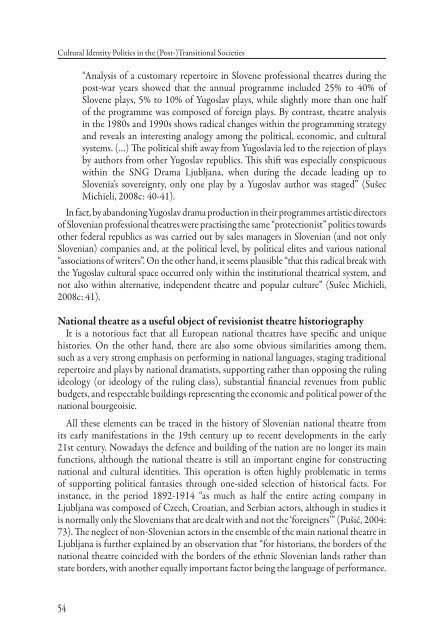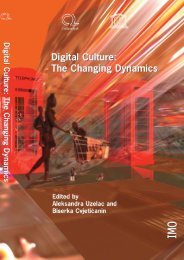free download in pdf format - Culturelink Network
free download in pdf format - Culturelink Network
free download in pdf format - Culturelink Network
You also want an ePaper? Increase the reach of your titles
YUMPU automatically turns print PDFs into web optimized ePapers that Google loves.
Cultural Identity Politics <strong>in</strong> the (Post-)Transitional Societies<br />
“Analysis of a customary repertoire <strong>in</strong> Slovene professional theatres dur<strong>in</strong>g the<br />
post-war years showed that the annual programme <strong>in</strong>cluded 25% to 40% of<br />
Slovene plays, 5% to 10% of Yugoslav plays, while slightly more than one half<br />
of the programme was composed of foreign plays. By contrast, theatre analysis<br />
<strong>in</strong> the 1980s and 1990s shows radical changes with<strong>in</strong> the programm<strong>in</strong>g strategy<br />
and reveals an <strong>in</strong>terest<strong>in</strong>g analogy among the political, economic, and cultural<br />
systems. (…) Th e political shift away from Yugoslavia led to the rejection of plays<br />
by authors from other Yugoslav republics. Th is shift was especially conspicuous<br />
with<strong>in</strong> the SNG Drama Ljubljana, when dur<strong>in</strong>g the decade lead<strong>in</strong>g up to<br />
Slovenia’s sovereignty, only one play by a Yugoslav author was staged” (Sušec<br />
Michieli, 2008c: 40-41).<br />
In fact, by abandon<strong>in</strong>g Yugoslav drama production <strong>in</strong> their programmes artistic directors<br />
of Slovenian professional theatres were practis<strong>in</strong>g the same “protectionist” politics towards<br />
other federal republics as was carried out by sales managers <strong>in</strong> Slovenian (and not only<br />
Slovenian) companies and, at the political level, by political elites and various national<br />
“associations of writers”. On the other hand, it seems plausible “that this radical break with<br />
the Yugoslav cultural space occurred only with<strong>in</strong> the <strong>in</strong>stitutional theatrical system, and<br />
not also with<strong>in</strong> alternative, <strong>in</strong>dependent theatre and popular culture” (Sušec Michieli,<br />
2008c: 41).<br />
National theatre as a useful object of revisionist theatre historiography<br />
It is a notorious fact that all European national theatres have specifi c and unique<br />
histories. On the other hand, there are also some obvious similarities among them,<br />
such as a very strong emphasis on perform<strong>in</strong>g <strong>in</strong> national languages, stag<strong>in</strong>g traditional<br />
repertoire and plays by national dramatists, support<strong>in</strong>g rather than oppos<strong>in</strong>g the rul<strong>in</strong>g<br />
ideology (or ideology of the rul<strong>in</strong>g class), substantial fi nancial revenues from public<br />
budgets, and respectable build<strong>in</strong>gs represent<strong>in</strong>g the economic and political power of the<br />
national bourgeoisie.<br />
All these elements can be traced <strong>in</strong> the history of Slovenian national theatre from<br />
its early manifestations <strong>in</strong> the 19th century up to recent developments <strong>in</strong> the early<br />
21st century. Nowadays the defence and build<strong>in</strong>g of the nation are no longer its ma<strong>in</strong><br />
functions, although the national theatre is still an important eng<strong>in</strong>e for construct<strong>in</strong>g<br />
national and cultural identities. Th is operation is oft en highly problematic <strong>in</strong> terms<br />
of support<strong>in</strong>g political fantasies through one-sided selection of historical facts. For<br />
<strong>in</strong>stance, <strong>in</strong> the period 1892-1914 “as much as half the entire act<strong>in</strong>g company <strong>in</strong><br />
Ljubljana was composed of Czech, Croatian, and Serbian actors, although <strong>in</strong> studies it<br />
is normally only the Slovenians that are dealt with and not the ‘foreigners’” (Pušić, 2004:<br />
73). Th e neglect of non-Slovenian actors <strong>in</strong> the ensemble of the ma<strong>in</strong> national theatre <strong>in</strong><br />
Ljubljana is further expla<strong>in</strong>ed by an observation that “for historians, the borders of the<br />
national theatre co<strong>in</strong>cided with the borders of the ethnic Slovenian lands rather than<br />
state borders, with another equally important factor be<strong>in</strong>g the language of performance.<br />
54



